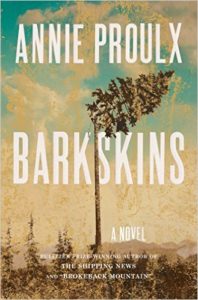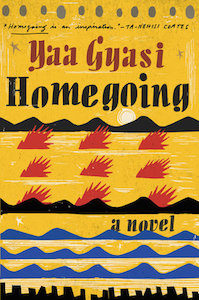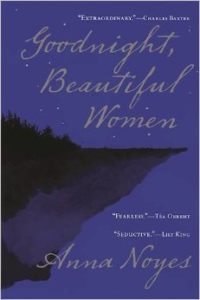Five Books Making News This Week: Forests, Feathers, and First Books
Annie Proulx, Yaa Gyasi, Max Porter, and More
The Printers Row Literary Festival brings authors Marilynne Robinson, Adam Haslett, Terry McMillan, Sebastian Junger, and others—plus staged readings of “Rutherford’s Travels,” an adaptation of Charles Johnson’s Middle Passage—to Chicago. The first novel by an Irish blogger (Arse End of Ireland) wins the Bailey’s Women’s Prize for Fiction. Head judge Margaret Mountford praises Lisa McInerney’s The Glorious Heresies for its black humor, and calls it “a superbly original, compassionate novel that delivers insights into the very darkest of lives through humor and skilful storytelling.” The Glorious Heresies is due out in the U.S. in August. Akhil Sharma’s Family Life wins the 2016 International IMPAC Dublin Award. (His An Obedient Father won the 2001 PEN/Hemingway Award.).“Suffering and the struggle to ameliorate suffering are not unknown in fiction but Family Life pulls off the extraordinary feat of showing them in their correct alignment,” the judges note. “Closing the book, having known this mix of light and dark, you are left with the sense that while reading you were actually at the core of human experience and what it is to be alive. This is the highest form of achievement in literature. Few manage it. This novel does. Triumphantly. Luminously. Movingly.”
Critics call Pulitzer Prize winner Annie Proulx’s new novel her best yet. The second novel in Ian Hearn’s fantasy novel series prompts binge-reading. First books by two Iowa Writers’ Workshop graduates—Yaa Gyasi and Anna Noyes—attract critical attention. And more on Max Porter’s Grief Is the Thing with Feathers.

Annie Proulx, Barkskins
Proulx defines her title for NPR: “Somebody who has skin like bark. People who work in trees would be a natural to be called barkskins. It’s not a word that’s commonly used and I can’t find where I heard it or saw it — it’s entirely possible that I made it up.” Some critics hail her fifth novel as a masterpiece.
“At more than 700 pages, covering three centuries, Barkskins is an awesome monument of a book, a spectacular survey of America’s forests dramatized by a cast of well-hewn characters,” writes Ron Charles (Washington Post). “…such is the magnetism of Proulx’s narrative that there’s no resisting her thundering cascade of stories. By drilling deep into the woods that enabled this country to conquer the world, Proulx has laid out the whole history of American capitalism and its rapacious destruction of the land.”
Proulx, “already a winner of the Pulitzer Prize and National Book Award for The Shipping News, and celebrated for her other novels and short stories (among them Brokeback Mountain) returns now, at 81, with Barkskins, a fifth novel that surpasses them all,” writes Katherine A. Powers (Newsday). She concludes:
The novel’s scope is huge and encompassing, its vision panoramic at times, at others focused minutely on all the doings and undoings of individuals: those left ravaged by the destruction of their way of life, and those engaged in the business enterprise at the heart of this book, from logging camp and river transport to sawmill on up to the boardroom. The novel is quite simply tremendous and, of Annie Proulx’s many fine works, “Barkskins” stands, in my view, as her masterpiece.
Michael Magras (Houston Chronicle) has some quibbles (“Proulx sometimes bogs down the narrative with extraneous detail”), but concludes,
Barkskins is a memorable plea against deforestation, with scenes that vividly depict the results of despoliation and the dangers both family lines suffered. It ends with the modern generation working to undo the damage wrought by their forebears.
But as Proulx makes clear, restoration can take centuries. Widespread plunder is a tough condition to reverse. When new seedlings sprout to replace pines cut down in a disputed border region between Maine, New Hampshire and New Brunswick, the forest “still lived,” Proulx writes, “but it was not what it had been.”
“Can novels do more than instruct and entertain?” asks Anthony Doerr (Outside). “Can they compel readers to create real change in the world? I pray they can. On a warming planet where we lose around eight million acres of forest each year—about 12 football fields per minute—understanding how we got here has never been more important. If Barkskins doesn’t bear exquisite witness to our species’s insatiable appetite for consumption, nothing can.”

Lian Hearn, The Tale of Shikanoko
In a prompt to binge read (and a glimpse of what innovative FSG publisher Sean McDonald is up to), four books in the fantasy tetralogy set in medieval Japan by Lian Hearn (the pen name of English author Gillian Rubinstein) are being published serially between late April and the end of September. The second in the series, Autumn Princess, Dragon Child, was released this week.
“The rapid publication of the Shikanoko novels frames them as episodes of the same story,” notes Charley Locke (Wired).
Robin Sloan (Electric Literature) assembles an online symposium:
Toby Barlow: “It feels paradoxically totally cinematic and utterly unfilmable, which is my favorite kind of book, and it’s something I try to write myself, so that you hold the book not as a dry run for a yet-to-be-made motion picture, but the thing in itself.”
Nicola Griffith: “It’s not predictable. At all. It doesn’t follow Western storytelling sensibilities, certainly not literary ones.”
Kelly Luce: “The world of the Shikanoko books is so richly imagined. The setting itself is novel to us, it is home to the unexpected, and yet it is populated with characters whose motivations and backstories strike an emotional chord. As readers, we then get to sympathize with these familiar feelings in an unfamiliar place. There’s a tension there between world and emotion, a safe and fruitful space. In that space, maybe, is where wonder and play and fun are created — the Fun Primordial Soup.”
Robin Sloan: “These books are delivered in a voice that is (a) a huge part of their pleasure, and also (b) totally beyond me. That serenity; that straightforwardness (even in its depiction of the very strange); that confidence!”

Yaa Gyasi, Homegoing
Gyasi’s first novel follows six generations of a family descended from two half sisters who never meet, encompassing the troubles and turmoils of slavery in West Africa and the U.S. Critics respond to her talent and the raw power of the work, while raising some questions about the limitations of the novel-in-stories form.
“The unhealed ruptures of slavery, persistent as memory…course through [this] hypnotic debut novel by Yaa Gyasi, a stirringly gifted young writer, that contemplates the consequences of human trafficking on both sides of the Atlantic,” writes Isabel Wilkerson (New York Times Book Review). “The West African chapters are the heart of the book, a deep channeling of multilayered humanity,” she adds. “Gyasi evokes what was lost to those who were sold away — the sense of individual and collective identity, a wealth of rituals and customs they’d be whipped for trying to retain in America.
Steph Cha (Los Angeles Times) calls the novel “for the most part a blazing success,” and addresses one of the novel’s shortcomings:
Homegoing is, in essence, a novel in short stories, so each chapter is forced to stand on its own, and inevitably, some chapters fare better than others.
But the same can be said of Jennifer Egan’s A Visit From the Goon Squad and Elizabeth Strout’s Olive Kitteridge, both of which won Pulitzers — these novels can work, despite structural limitations. The sum of Homegoing’s parts is remarkable, a panoramic portrait of the slave trade and its reverberations, told through the travails of one family that carries the scars of that legacy.
Laura Miller (The New Yorker) has similar reservations.
Too often, however, Gyasi struggles to make the linked-story form suit her epic enterprise. There are significant challenges to overcome, not least the lack of a central character to arrest the reader’s attention and carry it through the book. Each chapter must start in a new place and time, with a new set of people, at best picking up a few slender narrative threads from its predecessors. Linked stories aren’t the ideal way to deliver the amount of exposition that historical fiction requires. (It’s never a good sign when a novelist feels obliged to begin a bit of dialogue with “As you know by now, Quey . . .”) A novel has the room to work complications and variations on situations or characters, compelling readers to reassess them again and again. The short story is always in danger of reducing people to types, and Gyasi succumbs to this more than once.
Gyasi “shows the unmistakable touch of a gifted writer,” Miller writes, calling Homegoing “a specimen of what such a writer can do when she bites off more than she is ready to chew,” and grants that it “succeeds, by the end, in accumulating no small emotional power.”

Anna Noyes, Goodnight, Beautiful Women
This first story collection won the Iowa Writers’ Workshop’s Henfield Prize for Fiction. Noyes’ eleven stories, most portraits of young women coming of age sexually in hardscrabble Maine communities, draws praise for its spare, atmospheric style.
“Noyes’s stories work by elision,” writes E.J. Levy (Washington Post). “Partial, elusive, inconclusive, they are like lit windows on trailers glimpsed from the road. One has a sense of peering in, fascinated but no less baffled than the characters. Hers is a spare and disjunctive style. If the fiction of Stephen King and Alice Munro had a literary love child, it might look like this: luminous domestic moments married to a pervasive sense of threat.”
Elizabeth Poliner (New York Times Book Review) calls this first collection “artful,” and praises her “lucid prose.” She concludes:
While the characters in “Goodnight, Beautiful Women” suffer no shortage of hardship, and are often as much participants in their own downfall as they are victims of it, they are full of an honesty they can’t hide. As one woman remarks to another: “I see big news all over your face.”
“In this quietly menacing book, there are external negative forces that influence the characters, including pedophiles and dead parents,” writes Michele Filgate (Portland Press Herald) “But just as challenging are the internal predicaments.
The author is from Maine, where many of the stories are set or associated with. Her characters drink coffee brandy and read Stephen King. And on more than one occasion, she writes about women who are grappling with darker versions of the selves they present to others.”

Max Porter, Grief Is the Thing with Feathers
Porter’s Dylan Thomas award-winning first novel continues to gather glowing reviews.
Max Nelson (The New Republic) focuses on one of the three narrative lines (“Dad,” “Boys,” “Crow”):
Crow’s voice is the loudest and the strangest in Porter’s book. It is all irreverence and disruption. Yet something about this creature’s irreverence—even his nastiness and abrasiveness—gives him a special power to help Dad and the Boys cope with their loss. It hardly matters whether he’s a figment of Dad’s imagination or a kind of manifestation of the family’s grief. He knocks on the family door soon after the death of the Boys’ mother and at the height of Dad’s obsession with Crow, the strange, dark collection of poems Hughes published seven years after Plath’s death. Crow’s job, as he himself describes it, is to minister to the family in a way that flesh-and-blood mourners wouldn’t be equipped to. “In other versions I am a doctor or a ghost,” he says soon after his arrival. “We can do things other characters can’t, like eat sorrow, un-birth secrets and have theoretical battles with God. I was friend, excuse, deus ex machina, joke, symptom, figment, spectre, crutch, toy, phantom, gag, analyst and babysitter.”
Karen Gentry (The Rumpus) also puts Crow at the center of her review:
Dad is an awkward scholar at work on a tome in honor of his lifelong poet-crush, the book is titled Ted Hughes’ Crow on the Couch: A Wild Analysis. (Much like a time limit for mourning, he’s got fourteen months to finish it.) Yet it is Mum who drives the story, not just because she was witty and lovely and died and is keenly missed, but because before she died, she gave her husband a plastic crow to celebrate the completion of his book proposal. As a defender of the nest, Crow, like Mum, is cheeky. “I find humans dull except in grief.” He roams the house at night “down the dead Mum stairs” noting that “the whole place was heavy mourning, every surface dead Mum, every crayon, tractor, coat, welly covered in a film of grief.” He finds Dad asleep and whispers, “I will give you something to think about.” That’s the gift of Crow. The mystery of his coming to life gives Dad, Boys something else to think about other than missing Mum.
“To call this tiny but potent book a novel is to grossly misrepresent it,” concludes Ellen Akins (Minneapolis Star-Tribune), “but maybe that says more about our constrictive definition of the novel than it does about this book, which uses the writer’s, and Crow’s, whole bag of tricks to transform the indescribable absence that is grief into palpable, undeniable life.”




















